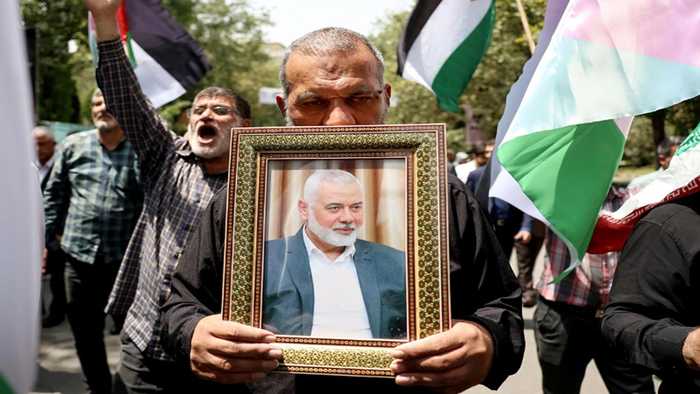Published 12:57 IST, August 1st 2024
Who is Yan Borysovych Koum —Billionaire Who Co-founded WhatsApp And His Link to Haniyeh Killing
Yan Borysovych Koum, Ukrainian-American billionaire & WhatsApp co-founder, is reportedly linked to the killing of Hamas leader Ismail Haniyeh. Who is he?
- World News
- 5 min read
New Delhi: The assassination of Hamas political chief Ismail Haniyeh has ignited massive controversy with recent reports suggesting that Israeli intelligence may have used spyware embedded in WhatsApp to pinpoint Haniyeh's location, leading to a lethal missile strike by the Israel Defense Forces (IDF) in Tehran, Iran's capital. Speculation has intensified following claims on X (formerly Twitter) that Yan Borysovych Koum, the co-founder of WhatsApp, could be linked to the assassination.
According to a user on X (formerly Twitter), Israeli operatives allegedly installed spyware on Haniyeh’s phone through a WhatsApp message. This allowed them to obtain his exact location, which subsequently led to the Israel Defense Forces (IDF) using a drone to launch a missile strike.
Who is Yan Borysovych Koum—Billionaire Linked to Haniyeh Killing
- Yan Borysovych Koum: Ukrainian-American billionaire and tech entrepreneur, co-founder of WhatsApp.
- Early Life and Education: Developed an interest in computer programming by age 18. Enrolled at San Jose State University while working as a security tester at Ernst & Young.
- Tech Industry Connections: Joined w00w00, a computer security think tank, where he met future Napster creators Shawn Fanning and Jordan Ritter.
- Meeting Brian Acton: Met Brian Acton in 1997 while working at Ernst & Young. Later joined Yahoo! as an infrastructure engineer and left school shortly after.
- Yahoo! Partnership: Worked with Acton at Yahoo! for nine years. Took a year off in 2007 to travel and play ultimate frisbee. Both applied to Facebook but were rejected.
- Inspiration for WhatsApp: In January 2009, Koum bought an iPhone and saw the potential of the App Store. Discussed his app idea with Alex Fishman and named it WhatsApp. Incorporated WhatsApp Inc. on his 33rd birthday.
- Growth of WhatsApp: Initially unpopular, WhatsApp gained popularity after Apple added push notifications in June 2009. Koum’s decision to add push notifications contributed to its growth.
- Acton’s Role: Recruited Brian Acton to join WhatsApp. Acton became a co-founder and helped secure $250,000 in seed funding.
- Facebook Acquisition: On February 9, 2014, Zuckerberg proposed a deal to Koum to join Facebook’s board. Ten days later, Facebook acquired WhatsApp for $19 billion.
- Stock Sales: Sold over $2.4 billion worth of Facebook stock in the first half of 2016, about half of his total holdings.
- Departure from WhatsApp: Announced his departure in April 2018 due to disputes. Initially thought to forfeit unvested stock but later received $450 million in stock through a "rest and vest" method.
The rumours about Yan Borysovych Koum’s involvement highlight growing worries about how tech platforms play a role in global conflicts. While there’s no concrete evidence linking Koum directly to the assassination, the claim that WhatsApp's technology was used has raised several questions about the impact on privacy and security.
"The Israelis are not only inciting war with Lebanon but now directly with Iran. These Israelis are despised by the real Jews and intent on starting WWIII," a user wrote on X in response to the speculations.
Another said,""They're LITERALLY proving time and time again that they have the tech to target the "militants" They're after and still bomb civilians on top of killing prominent figure who wanted a ceasefire." 
Ismail Haniyeh Assassination
Hamas leader Ismail Haniyeh was killed by a predawn airstrike in the Iranian capital Wednesday, Iran and the militant group said, blaming Israel for a shock assassination that risks escalating the conflict even as the US and other nations were scrambling to prevent an all-out regional war. Iran's supreme leader vowed revenge against Israel.
There was no immediate comment from Israel, which has pledged to kill Haniyeh and other Hamas leaders over the group's October 7 attack on southern Israel. The strike came just after Haniyeh had attended the inauguration of Iran's new president in Tehran — and only hours after Israel targeted a top commander in Iran's ally Hezbollah in the Lebanese capital Beirut.
The assassination of Hamas' top political leader was potentially explosive amid the region's volatile, intertwined conflicts — because of its target, its timing and the decision to carry it out in Tehran. Most dangerous was the potential to push Iran and Israel into direct confrontation if Iran retaliates.
“We consider his revenge as our duty,” Iranian supreme leader Ayatollah Ali Khamenei said in a statement on his official website. He said Israel had “prepared a harsh punishment for itself” by killing "a dear guest in our home." Bitter regional rivals, Israel and Iran risked plunging into war earlier this year when Israel hit Iran's embassy in Damascus in April. Iran retaliated and Israel countered in an unprecedented exchange of strikes on each other's soil, but international efforts succeeded in containing that cycle before it spun out of control.
Haniyeh's killing could also prompt Hamas to pull out of negotiations for a cease-fire and hostage release deal in the 10-month-old war in Gaza, which US mediators had said were making progress.
Updated 12:57 IST, August 1st 2024